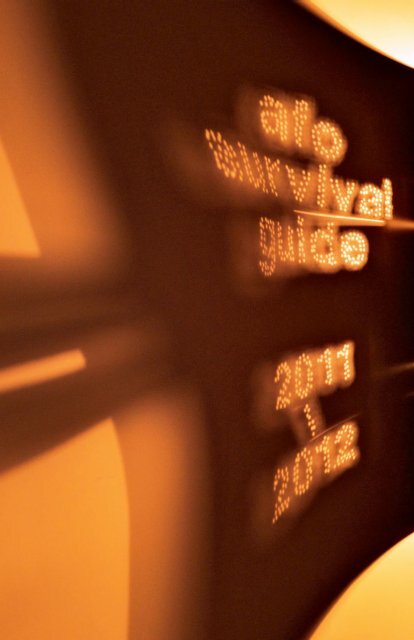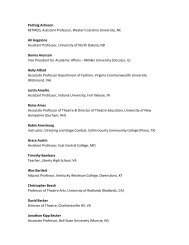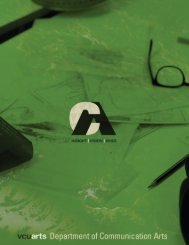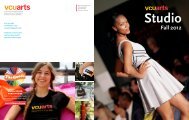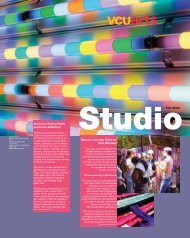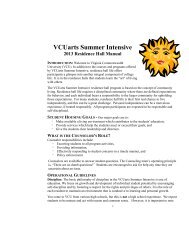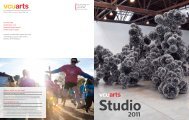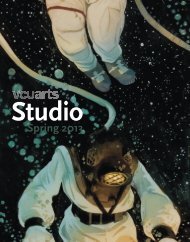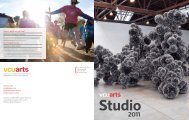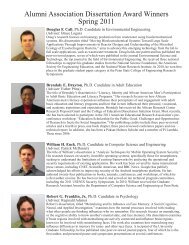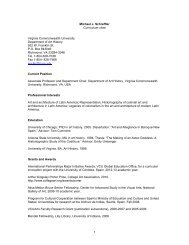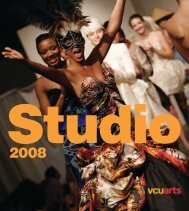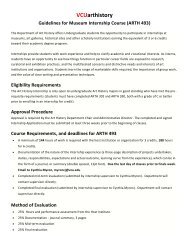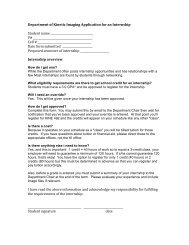2011-2012_survival guide - VCUarts
2011-2012_survival guide - VCUarts
2011-2012_survival guide - VCUarts
- No tags were found...
You also want an ePaper? Increase the reach of your titles
YUMPU automatically turns print PDFs into web optimized ePapers that Google loves.
2 Letter from the Director3 Who’s Who5 Curriculum6 Art Foundation Program Core Courses8 Honors College9 Attendance Policy10 Registration11 Honor Code : Community Responsibility12 Grading Standards : Students with Disabilities13 Grading Scale : Advising14 Advisors15 Art and Design General Education Requirements16 Required Textbooks17 Materials and Supplies18 Computer Requirements19 Equipment Use Policy : Studio Walls : Installation20 Installation Guidelines : Prohibited Materials : Graffiti21 Departmental Portfolio Review22 Opportunities and Scholarship Information23 Resources25 Frequently Used Phone Numbers26 AFO is...27 Words of Wisdom28 VCU E-MAIL!Table of Contents
Welcome to VCU’s Art Foundation Program and congratulations!You are about to embark on an exciting year of new experiences, newpeople and new ways of thinking and making. The Art Foundation yearis a crucial and formative one. It sets the stage for your Art and Designeducation at VCU. In addition to academics, your schedule will includeDrawing, Time, Surface and Space, core studio classes that will expandyour understanding of what you can accomplish and what interests you.By the end of the Program, half of our students change their minds aboutthe major they will pursue; a testament to how life-changing this year willbe!The Art Foundation experience promises to be both rich and demanding.You will be asked to try new things and step outside what is comfortableand familiar. Expect to be challenged, expect to work hard and you willbe amazed what you will learn and what you are able to accomplish. Thebest advice I can offer is to take advantage of every opportunity being apart of the School of the Arts and the University provides, whether it bediscussions, assignments, visiting artists, lectures, competitions, the library,the Richmond art scene, your knowledgeable faculty, etc, etc. Squeezeeverything out of the experience you can.As a new member of the School of the Arts you are joining a strongcommunity of students, faculty and alumni. Your classmates will beexceptional students like yourself. You will raise the bar for one another,befriend one another and challenge one another. Relationships forged hereare valuable and long-lasting ones, continuing throughout your career in thearts.Your education is in your hands. We’ll offer the tools: the faculty, theclassmates, the facilities and the environment, in which you can prosper.Bring your curiosity, eagerness and energy. We look forward to sharing inyour accomplishments. It will be a wonderful year.Welcome.Elissa ArmstrongArt Foundation Associate Director
Who’s WhoElissa ArmstrongAssociate Director,Assistant ProfessorSarah MizerAdministrative Director,Assistant ProfessorChris CostelloCoordinatorErin BattsAssistant CoordinatorChris NorrisStudent Coordinator / Transfer AdvisorMatt SpahrWoodshop Coordinator3
Who’s WhoErin NeffSenior Admissions CounselorBrad BirchettAcademic AdvisorAnthony MeloroAcademic AdvisorBrooke ChornyakAssistant ProfessorHope GinsburgAssistant ProfessorMatt KingAssistant Professor4
CurriculumFall SemesterCourse Title CreditsARTF 13XARTF 13XARTF 139ARTH 103UNIV 111University CoreAFO Studio or Research class*AFO Studio or Research class*ProjectSurvey of Western Art IFocused Inquiry ITotal33133313 – 16Spring SemesterCourse Title CreditsARTF 13XARTF 13XARTF 139ARTH 104UNIV 112University CoreAFO Studio or Research class*AFO Studio or Research class*ProjectSurvey of Western Art IIFocused Inquiry IITotal33133316*Please note that there is no sequential order to theArt Foundation Studio / Research classes:ARTF 131, ARTF 132, ARTF 133, and ARTF 134.5
Art Foundation Program Core CoursesARTF 131 - Drawing Studio3 credits, offered Fall and Spring SemesterDrawing is a fundamental tool of Fine Art and Design. It is a means of focusing one’spowers of observation and generating ideas. Drawing cultivates an ability to envisionand anticipate projects across all disciplines. This three-credit, semester-long coursecultivates drawing skills that are essential to all artistic practice.Drawing from A to Z. Drawing Studio is an intensive drawing course covering thehistoric principles of drawing and their place in contemporary Art and Design. Thecourse provides an in-depth investigation of line, perspective, the figure, gesture,space, atmosphere, erasure, etc. Through the repeated physical activity of drawing,students will refine their dexterity and intellectual powers of observation andvisualization.ARTF 132 - Surface Research3 credits, offered Fall and Spring SemesterTwo-dimensional design skills are essential to the success of students in Fine Artand Design. Understanding two-dimensional imagery is essential to all majors in theSchool of the Arts. This three-credit, semester-long immersion into two-dimensionalimagery and design establishes a foundation for all artistic practice.Surface is the two-dimensional locus of points. ‘Surface Research’ uses this definitionboth literally and metaphorically to explore methods of generating, organizing andediting planar imagery. This class will include basic principles of two-dimensionaldesign, color and visual organization in traditional, digital and lens-based media.Course content will explore the context of imagery in the larger culture and thepotential of art and design.6
Art Foundation Program Core CoursesARTF 133 - Space Research3 credits, offered Fall and Spring SemesterThree-dimensional skills are essential to the success of all students in Fine Art andDesign. Envisioning space and thinking in three dimensions is crucial to all studiomajors in the School of the Arts. This three-credit, semester-long immersion intomaterial and space cultivates the skills necessary for all artistic practice.Space Research is a semester-long course that explores the fundamental principalsof three-dimensional art and design practices. Hands-on projects introduce studentsto methods, tools, and materials ranging from time-honored building techniques toexperimental studio processes. Students acquire a broad set of construction skillswhile they hone their ability to understand, envision, and communicate effectivelyabout space, objects, scale, and the relationship of the body to the built environment.ARTF 134 - Time Studio3 credits, offered Fall and Spring SemesterTime-based work is an important element of contemporary Fine Art and Design andis fundamental to all studio majors in the School of the Arts. The fields of Fine Artand Design have been redefined by the advent of technology capable of recordingmoving images. Additionally, notions of ephemerality, duration, performance, anddocumentation have become integrated into traditional media in Fine Art and Design.Time Studio is a three-credit, semester-long immersion into the possibilities of timebasedwork including film, video, animation, sound and performance.Time Studio brings together tenets of contemporary practice that have extendedthe fields of Fine Art and Design. Time-based media such as film, video, animationand sound are included in this mix. The historically under-represented impulses oftheatricality and performance will be explored in this course. Time studio will usevideo as a primary tool, but will address larger issues of ephemerality, duration andthe possibilities of the moving image.ARTF 139 - Project1 credit, five weeks, offered Fall and Spring SemesterProject courses are one credit classes designed to allow students a direct experiencewith the Fine Art and Design departments in their foundation year. These modulesallow students access to the school’s individual programs and give students moreinformation from which to choose their major. ‘Project’ topics will be chosen by thesponsoring Fine Art and Design departments. ‘Project’ is taught in each department’sfacility and frequently encompasses a single project from start to finish.7
Honors CollegeStudents in the Honors College are part of a large university and an intimatecommunity of dedicated scholars. Honors college students have at their disposalthe resources of a major urban research university and world-class professionalschools while attending small classes with diverse topics that emphasizeparticipation in dynamic discussions alongside 20 or fewer energetic honorsstudents. Other benefits include:• Enroll in classes open only to honors students, where classsize is limited to encourage student participation and interaction• Live in honors-only residence halls• Apply for scholarships only available to honors students• Register early for classesFor more information about the Honors College please visit their web site at:honors.vcu.eduArt Foundation Honors CourseARTF 191 - Art Worlds3 credits, offered Fall <strong>2011</strong>, open to Art Foundation Honors Students only or bypermission of the instructorThere are many concentric and overlapping ‘Art Worlds’.An Art World is a territory defined by institutions, curators, artists, writers andtheorists. Using <strong>VCUarts</strong> as a starting point, this course will chart the geographiesof local, national, and international Art Worlds. In this course, students will studyindividual artists as a means to examine the larger phenomena of Art and Designaround the world. This is primarily a research-based class. Students should expectfrequent readings, presentations and research assignments. ‘Art Worlds’ willculminate in a class field trip.8
Attendance PolicyAttendance at all class sessions is mandatory. Class time plays a significant rolein your education and this policy is strictly upheld. In-class experiences cannot besubstituted or replicated in any other way. The following attendance policy appliesto all courses in the Art Foundation Program. All absences count equally regardlessof cause (including illness). There are NO exceptions to this policy.Research and Studio Classes (ARTF 131,132, 133, 134)Each absence will affect your final grade. A student’s final grade will automaticallybe lowered when absent for more than two sessions. A fourth absence constitutesa failing grade for the course. Art Foundation studio classes meet for 2 three - hourstudio sessions per week. Missing either session will count as one absence. Somecourses meet on Friday for two separate sessions in one day. Each missed sessioncounts as one absence.Project courses (ARTF 139)Attendance is especially important for Project courses that meet for only five weeks.A student’s final grade will automatically be lowered when absent for more than onesession. A third absence constitutes a failing grade for the course. Each missedsession counts as one absence.Late AttendanceStudents are expected to attend class on time. Frequent lateness will count asan absence. Specific policies regarding lateness will be clearly outlined by yourinstructors in their course syllabi.Withdrawing From ClassesStudents may withdraw from a class at any time prior to the published withdrawaldate without penalty. After that date, students cannot withdraw from a class andwill receive a grade for the semester. Withdrawal dates for Studio classes will bedifferent than the Project class withdrawal dates. (See Registration).9
RegistrationThe last day to add or drop from a full-semester class for a full refund is:Wednesday, August 31, <strong>2011</strong>.The last day to withdraw from a full-semester class is: Friday, November 4, <strong>2011</strong>.A grade of W will be assigned as a grade if a student withdraws prior to this date.After this date, a final grade for the semester will be assigned.5 - week ARTF 139 Project courses have a separate add , drop and withdrawschedule:• Project courses can be added up until the start date of the course.• The day after the first class of a Project course is the last daythat it can be dropped.• The withdrawal dates for Project courses differ by each section and areapproximately two weeks after the first day of the class. Please check withRecords and Registration for the official date.Students can make changes to their schedules using eServices which is locatedat www.vcu.edu through the VCU portal. Only students can make changes to theirschedules. Faculty and staff are unable to make schedule changes. Consult youracademic advisor before making changes to your schedule.Retroactive Drops or Retroactive WithdrawalsThese are issued only in the most critical or severe circumstances. Official anddetailed documentation for the basis of the appeal is necessary to request anappeal. See your academic advisor for more information.Incomplete GradesAn incomplete grade is issued only in cases of emergency or severe health-relatedcircumstances. A student must request and gain the instructor’s approval in orderto be issued an incomplete. Once granted an incomplete, a student has up to 30days into the next semester to complete, or make up, the missed work.10
Honor CodeThe VCU Honor Policy is available in the VCU Insider, the student handbook locatedat: www.students.vcu.edu/insider.html . The VCU Honor Policy (pg. 131) applies tothe entire University as well as all areas of the School of the Arts.Honor violations in the Arts and Design are sometimes less black and white than inother disciplines. Beyond the obvious violations like theft and vandalism, Visual Artsviolations include the submission of work completed for one class and presentedfor credit in another class.Questions about authorship and originality have been at the forefront oftheories about Art and Design. These issues are distinct from the honor code.Understanding and questioning the appropriation of imagery, and the propriety ofan artist’s work or ideas, is an integral part of your experience as a student in Artand Design.Community ResponsibilityThe Art Foundation Program is one of the largest academic units in the University.Each year, the facility, tools and equipment are shared by more than 500 students.This demands that everyone work with consideration, respect and good humor.Part of this responsibility is making clean-up integral to your everyday practice. Youare expected to leave your work area in better condition than when you found it.As student artists and designers, you create the physical environment in which youwork. While the act of creation is rarely clean or orderly, working in someone else’schaos is a drag! Here is a promise: you will make better art if cleanup is part ofyour routine.Additionally, students will participate in an end-of-the-semester clean up duringwhich all classrooms, lockers, abandoned materials and projects will be purged.Students will be notified via e-mail when the final clean up is scheduled.11
Grading StandardsUniversity courses and <strong>VCUarts</strong> courses are taught with high expectations. Manystudents are unaccustomed to the high standards by which they are evaluated andgraded.Perfect attendance, meeting all deadlines, and working at your peak ability areuniversal expectations. Art Foundation standards are high, and only the mostrigorous and consistently exceptional students earn high grades. Expect yourgrades to be lowered if you do not meet the standards and deadlines set by yourinstructor.Classroom conduct has an impact on course grades. You are expected to activelyparticipate in class activities and be a considerate member of the ‘community’within the classroom. Students who are disruptive to class may be removed fromthe class and their grades lowered accordingly. Please refer to.students.vcu.edu /docs / policy_student_conduct.pdf for University policies relating to conduct.Not having supplies, for any reason, does not excuse participation in requiredactivities or missed deadlines.Students with DisabilitiesIf you need special accommodations due to a disability or medical condition (aslisted in VCU’s Resource <strong>guide</strong>, The Insider, pg.4, www.students.vcu.edu/insider.html) you must be registered with the VCU Office of Disability Support Services:804 828 2253.Students are strongly encouraged to provide a copy of the official accommodationform to each of their instructors at the beginning of each course. Reasonablenotification is necessary to plan and coordinate accommodations. Retroactiveaccommodations will not be made.Please note that the attendance policy remains in effect for those with disabilities.A disability does not excuse anyone from completing an assignment or meeting adeadline. Please understand that while we are here to help facilitate and enhanceyour education, students are responsible for their attendance and completion of allrequired work. Further information can be found on the web at:www.students.vcu.edu/dss.12
Grading ScaleA Outstanding Consistently exceptional work that raises thestandards for one’s entire peer groupB Above Average Exceeding the requirements / expectations of the classC Average Meeting all class requirementsD Below Average Completion of most, but not all, course requirementsF Fail Failure to meet the requirements of the courseAdvisingAcademic advisors empower students to become increasingly self - directed in theireducational planning. All students are responsible for meeting with their academicadvisor no less than twice a semester.Transfer StudentsIn order for Art Foundation to consider all your college credits for transfer, pleasearrange to have your most up-to-date official transcripts sent to the Art Foundationoffice from all previously attended institutions. Courses with a final grade of C orhigher are eligible for transfer.One hundred-level studio classes are considered for transfer into VCU’s ArtFoundation program on a case-by-case basis. Remaining Art & Design courses willtransfer as art elective credit until a student enters a major department and creditsare re-evaluated.13
AdvisorsAdvisors are here to:• Help students define and develop realistic goals• Identify special needs• Match students to available resources• Help students plan course schedules, clarify prerequisites and select majors• Monitor progress toward academic success and career goals• Teach students to maneuver within <strong>VCUarts</strong> and the academic systemAll students are responsible for meeting withtheir academic advisor no less than twice asemester.Transfer Students and Change of MajorStudents: to schedule an appointment withyour advisor, Chris Norris, call 804-828-1129.Chris NorrisStudent Coordinator/Transfer AdvisorFreshmen may schedule an appointment withtheir academic advisor through eServices.Brad BirchettUniversity College Academic AdvisorAnthony MeloroUniversity College Academic Advisor14
Art and Design General Education RequirementsHighlights of the VCU Core Curriculum:The Core includes 21 credit hours that all undergraduate students at VCU willcomplete across all programs of study.Tier I: 6 credit hours - Focused Inquiry I and II, a two-semester sequence requiredof all first-year students, provides the foundation for the program.Tier II: As a compliment to Tier I, Tier II courses across the three areas reinforcethe learning objectives introduced in the Focused Inquiry sequence. Courses in thesecond tier are drawn from across the university and include:• 3 credit hours: A quantitative literacy course. (approved list below)MATH 121, 122, 123 Perspective Geometry, Tessellations, VisualizationsMATH 131 Introduction to Contemporary MathematicsMATH 141 Algebra with ApplicationsMATH 151 Precalculus MathematicsMATH 200 Calculus with Analytic GeometryMGMT 171 Mathematical Applications for BusinessSTAT 208 Statistical Thinking• 3 credit hours: A research and academic argument course.(For Arts this is UNIV 200)• 9 credit hours: one course from each of these areas:(continued on pg 16)humanities/fine arts;ENGL 215 Readings in LiteratureHIST 201 The Art of Historical DetectionHUMS 250 Reading FilmHUMS 300 Great Questions of the Social SciencesMASC/INTL 151 Global CommunicationsPHIL 201 Critical Thinking About Moral ProblemsPHIL 250 Thinking About ThinkingRELS 108 Human SpiritualityWRLD/INTL 203 Cultural Texts and ContextsWRLD 203 Introduction to World Cinema15
Art and Design General Education Requirements (cont)social/behavioral sciencesANTH/INTL 103 Cultural AnthropologyECON 101/INTL 102 Introduction to Political EconomyHUMS 300 Great Questions of the Social SciencesINTL 101 Human Societies and GlobalizationPOLI 103 U.S. GovernmentPOLI/INTL 105 International RelationsPSYC 101 Introduction to PsychologySOCY 101 General SociologyWMNS 201 Introduction to Women’s Studiesnatural science/mathematicsBIOL 101 Biological ConceptsBIOL/ENVS 103 Environmental ScienceCHEM 110 Chemistry and SocietyENVS 201 Earth System ScienceFRSC 202 Crime and ScienceINSC 201 Energy!PHYS 103 Elementary AstronomyPHYS 215 Science, Technology and Society (Tier III)For SACS/NASAD a total of 30 credits are required, so an additional 9 creditscompletes the General Education requirements. Each department has identifiedindividual solutions. (See the bulletin for department specific requirements.)Required TextbooksARTH 103 + ARTH 104Art: A Brief History, 4th editionMarilyn Stokstad. Prentice Hall, 2009.ISBN – 9780136059097<strong>2011</strong>-<strong>2012</strong> Summer Reading ProgramThe Other Wes MooreWes Moore, Spiegel & Grau, 2010ISBN – 9780385528191Suggested for ARTF 13XArtist’s Complete Health & Safety GuideMonona Rossol, Allworth Press, 2001ISBN – 978013605909716
Materials and SuppliesMaterials in the Art Foundation Program are the equivalent of textbooks foracademic classes. You should expect each class and every teacher to requirespecific supplies totaling around $300 per studio class. The Art FoundationProgram is unable to provide art supplies to students for studio work.Please anticipate at least $1200 in art supply expenses during your first year at<strong>VCUarts</strong>. It is often convenient or advantageous for Art Foundation students to setup accounts or purchase plans with one or more of the three local vendors near theVCU campus.Each student must be equipped with a basic set of tools for use in their classes.The tools do not need to be new, or state of the art, but everyone is required tohave a basic toolkit without exception. Teachers provide their individual supply listsat the beginning of class.Not having the required computer hardware, software or materials is not an excusefor late and / or incomplete assignments.Required Tools• safety glasses or goggles• 16 - ounce hammer• metal measuring tape (at least 10')• combination square• drill (electric or cordless)• set of drill bits• wood glue• sandpaper (assorted grits)• matte knife• pliers (square jawed or needle nose)• combination or keyed lock (to lock your tools in a locker)• pencils• drop cloth• Adobe Creative Suite Design Standard *• Microsoft Office (or equivalent word processing program) *• USB flashdrive or firewire hard drive• digital camera with video capability* Software is available at an educational discount from campusestore.com.17
Computer RequirementsEvery student is required to have a computer that meets or exceeds University andArt Foundation Program standards, which can be found at www.vcu.edu/sci.Art Foundation is a preparatory program required for entry into all Visual Artsand Design disciplines within <strong>VCUarts</strong>. Computer requirements for studentsvary significantly from department to department, including platforms, operatingsystems, and software. Because many students entering the Art FoundationProgram are uncertain which major they wish to enter, and because placement inany particular department is not guaranteed, we recommend that students bring acomputer from home for use during the first year of college.The Art Foundation computer labs are equipped with Apple computers. However,it is not necessary for a student to purchase an Apple if they already own a PCor an Apple computer that meets the University’s minimum requirements. You willfind Apple computers most compatible with the assignments given in Time Studioclasses, though assignments can be completed in the school lab.<strong>VCUarts</strong> Computer Center has a rental program for School of the Arts studentsin order to alleviate the need to purchase a computer before you enter a majordepartment. This rental program leases MacBook Pro laptops equipped withall software required by the Art Foundation Program. Please visit the <strong>VCUarts</strong>Computer Center online at www.arts.vcu.edu/computing or call 804 827 1249 formore information and pricing.If you choose to purchase a new computer, please keep in mind that the computeryou purchase may not meet the technical requirements of the department that youenter.18
Equipment Use PolicyStudents are not permitted to use University or School equipment, facilities, orlicensed material (including software) on or off campus for professional projectsof their own, for example, engaging in work for hire with a company or individual.This will be considered a criminal offense and could result in legal action and / orsuspension from the University. The only exception to this policy is for projectsformally sanctioned by a <strong>VCUarts</strong> department or program and supervised by afaculty member associated with that department or program.<strong>VCUarts</strong> students are only permitted to use University or School equipment,facilities, and licensed material (including software) off campus if such use is fora formal class assignment supervised by a <strong>VCUarts</strong> faculty member. Questionsabout this policy should be referred to the director of the responsible department orprogram.Studio WallsIt is never acceptable to paint on, draw on or damage the walls of the ArtFoundation studios. Students are responsible for repairing any damage to the wallsand keeping their condition intact.Installation Permission RequestStudents who wish to present a 3-D installation in the Art Foundation facilitymust complete a “Special Installation Request Form.” This form is available at theArt Foundation office front desk. Discuss your project in detail with your studioinstructor, complete the form and obtain their signature prior to submitting the formto our Student Coordinator, Chris Norris, for the final okay. Please note that anyplanned alterations to the walls or the building must be specifically outlined in yourproject proposal and the installation location returned to its original state as soon asyour piece is dismantled.We recommend that you make your installation requests well in advance to secureyour preferred space.19
Installation Guidelines• Installations can only be installed in the 5th floor of the Bowe Street ParkingDeck. Please do not attempt to install anything in any other areas of the deck.Parking and Transportation is not a part of the School of the Arts andunfortunately views installations as vandalism and will prosecute.• No pieces can be hung from the ceiling in any part of 5th floor space of BoweStreet Deck.• Installations are prohibited within stairwells, elevators, and restrooms.• Look out for tow tags! If work is left around too long, there is a good chance itwill be towed (which means it will be thrown out).Prohibited MaterialsThe following materials may not be used in the Bowe Street facility or adjacentparking deck and lot for ethical and health reasons:• spray paint• open flames or volatile material (including candles)• plaster• toxic or fume - generating materials (resins, fixative, etc.)• animals or fish (dead or alive)• fibreglass insulationUse of prohibited materials on campus will result in academic repercussions.GraffitiGraffiti and tagging is a criminal offense that is taken very seriously by the City ofRichmond police, judicial system, the VCU police and University officials. Severalformer Art Foundation students have completed prison terms for this offense.The first offense has a mandatory sentence of 90 days. A recent sentence for astudent found guilty of property damage was 15 months. In addition to jail time,graffiti and tagging violations can result in being expelled from the university.20
Department Portfolio ReviewsAfter successfully completing the Art Foundation Program all students enter a majorArt or Design department.During the first week of April, Art Foundation students with a GPA of 2.0 orgreater are eligible to apply for admission into one of the following Art and Designdepartments: Art Education, Communication Arts, Craft / Material Studies, FashionDesign, Graphic Design, Interior Design, Kinetic Imaging, Painting and Printmaking,Photography and Film, or Sculpture + Extended Media.During this centralized portfolio review, all departments review students’ artworkand their academic performance. Most dedicated students are accepted into theirpreferred major. However, successful completion of the Art Foundation Programdoes not guarantee acceptance into your preferred department. Students notaccepted into their first choice may be accepted into another department andreapply to their preferred department the following year.Detailed portfolio review <strong>guide</strong>lines will be emailed during the month of February tostudents’ VCU email accounts. There will be information sessions, workshops, andadvising available to facilitate all students through this process.Department Portfolio review : Transfer StudentsIf you are a transfer student, you might finish Art Foundation in December. Theportfolio review deadline for Spring admission is November 1, <strong>2011</strong>. The followingdepartments will review portfolios for Spring admittance:• Art Education• Craft / Material Studies• Painting and Printmaking• Sculpture + Extended MediaSpace in these departments may be limited due to enrollment. If you havequestions about applying to a department, contact Chris Norris: acnorris@vcu.edu. Departments not listed above only review portfolios in April during the Springportfolio review for fall admittance.Any override decisions are made by the department Chair and are based onavailability.21
OpportunitiesScholarshipsArt Foundation Dean’s Awards ( x2)During the Spring Portfolio Review, each Art and Design department nominatesan outstanding student to be considered for the Dean’s award. Following thereview, Art Foundation awards two nominees with a scholarship of $2000. All ArtFoundation students who participate in the Portfolio Review are considered forthese awards during the spring semester. No application is required.Art Foundation Outstanding Achievement Awards ( x5)Outstanding Achievement Awards are presented to exceptional students whomade significant contributions to the classroom and created an ambitious body ofwork. At the end of the spring semester of the Art Foundation year, these studentsare nominated by their faculty and selected by an Art Foundation committee andawarded a gift for their accomplishments. No application is required.James Kieran Foley Memorial ScholarshipAvailable to all AFO students who have filled out a FAFSA form. The award is basedon artistic ability and financial need. No application is required.Scholarships available to all <strong>VCUarts</strong> undergraduate students can be found at:www.vcu.edu /arts /scholarships. Additional opportunities will be announcedthroughout the year through students’ VCU email.Student AccountingInformation about tuition and bills can be found at: enrollment.vcu.edu/accountingor through the eServices tab in myPortal.Financial AidInformation about Financial Aid can be found at:enrollment.vcu.edu/finaidInside <strong>VCUarts</strong>A highly informative site with links to various resources ranging from studentservices such as financial aid and registration to local shops providing art relatedservices: arts.vcu.edu/inside22
ResourcesArt Supply ResourcesMain Art, Frame, and Gallery (locally owned small business)1537 West Main Street804 359 3499Barnes & Noble @ VCU Bookstore (streamlined art supplies)1111 West Broad Street804 828 1594Plaza Art (national chain)927 West Grace Street804 359 5900Computer & Printing ResourcesArt Foundation Computer LabBowe Street Parking Deck, 609 Bowe Street, Room 526804 828 9247<strong>VCUarts</strong> computer rental programarthelp@vcu.eduUptown Copy (full service print shop)1205 West Main Street804 353 2679Wythken Printing911 W. Grace Street (between N. Harrison and Shafer)804 353 8282Shop and Material ResourcesArt Foundation WoodshopBowe Street Parking Deck, 609 Bowe Street, Room 540804 827 7307School of the Arts Woodshop and Foundry (in Sculpture)1000 West Broad Street, Room 112804 828 1160, 804 828 1511Lowe’s (National Chain)1640 West Broad Street804 219 0640Pleasants Hardware (locally owned)2024 West Broad Street804 359 938123
ResourcesPhoto ResourcesAction Photo Company3535 Ellwood Ave804 355 7103Richmond Camera213 W Broad Street804 648 0515B&H Photo Video and Pro Audiowww.bhphotovideo.comKinkos1111 E Main St804 783 9880University ResourcesRecords and RegistrationHarris Hall - 1015 Floyd Ave - 1st Floor804 828 1349Financial AidHarris Hall - 1015 Floyd Ave - 1st Floor804 828 6669Student AccountingHarris Hall - 1015 Floyd Ave - 1st Floor804 828 2228Student CounselingStudent Commons - 907 Floyd Ave - Rm 238804 828 6200Student Health Services1300 W Broad Street Suite 2200804 828 8828Visual Arts ResourcesVirginia Museum of Fine Arts (the largest collection in VA)Corner of Grove Avenue on the Boulevard804 340 1400Visual Arts Center1812 West Main Street804 353 009424
Frequently Used Phone NumbersAdmissions 828 1222Anderson Gallery 828 1522Art Education 828 1996Art Foundation 828 1129Art History 828 2784Campus Learning Center 827 8108Cary Street Gym 827 1100Cinema 828 2787Commons Information Desk 828 1981Communication Arts 828 3658Counseling Services 828 6200Craft / Material Studies 828 1477Dance and Choreography 828 1711Deans’ Office 828 2787Dining Services 828 1148Disability Support Services 828 2253Escort Service 828 9255Fashion Design 828 1699Financial Aid 828 6669Graphic Design 828 1709Health Services 828 8828Interior Design 828 1713Kinetic Imaging 828 7204Libraries 828 1110MCV Gym and Aquatic Center 828 6100Multicultural Student Affairs 828 6672Music 828 1166Painting and Printmaking 828 1696Parking and Transportation 828 7275Photography and Film 828 1695Records and Registration 828 1349Residential Life & On Campus Housing 828 7666Sculpture + Extended Media 828 1511Shuttle Bus 828 7275Student Accounting 828 2228Technology Services Help Desk 828 2227Theatre 828 1514University College Advising 827 8648Weather Hotline (Information on closings) 828 673625
AFO is...AFO is an Acronym for:Anonymous Flying ObjectAcronym For OfficialsAnarchists For OrderAntichrists Feel ObviousA Funny OdorAlien Fungus ObservatoryAutistic Fries OctopiAngry Frowning OctopusA Freshman OrderArt Full OnAlmond Filled OreosAlien Fighting OrganizationArtistic FormalistsArtistic Ferrets OscillateAnt Farms OnlyArt Frees OurselvesAnonymous Ferrets OrganizeAgainst Formal OrangesA Flagrant ObsessionAggravating Ferret ObsessionArtificial Fish OvaAngular Facial OpeningsAnother Forged OriginalFor more fun facts and helpful links visit the AFO website:http://www.arts.vcu.edu/artfoundation/Also you can fan us on our Facebook Page: <strong>VCUarts</strong> ArtFoundation Program where happenings and events arehighlighted and many “shout outs” are heard calling attention toextraordinary works!26
Words of Wisdom“...The most valuable thing I have learned over my time in AFO is that you can makenearly anything happen if you want it badly enough...”- Ellie Doughty“From guest workshops to movie nights, there’s many activities to participate in ontop of your classes. The saying ‘you get out what you put in’ really applies to AFO.If you make an effort to participate in the extra activities that are offered and if youdedicate yourself to your work, you’ll grow a lot during your first year.”- Ellie Doughty“...I’ve realized that there’s almost no limit to what I can do or make with enoughtime (or even no time at all). Any material you can name can be bent or cut or gluedor carved into usefulness...I would say I’ve pushed myself to my limits, but I thinkI’ve discovered that my limits extend much further than I had imagined.”- Emily Herr“AFO is a roller coaster. It is intense and worth it...” - Jasmin Calvert“The best advice I can give to anyone entering AFO comes down to this: 1) Do notbe afraid to let loose and have fun. The work is important, but doing well in schoolis not limited to the academics. 2) Make good use of your time. Use all the time youhave to do something productive. Every minute, every blurry sketch, and every ideacounts.” - Lili Un“The classes I took this year allowed me to pursue work different from what I hadbeen making in high school, and allowed me to follow artistic interests that I hadnever had the opportunity to experiment with.” - Stephen Elefante“You are definitely immersed in a variety of concepts and mediums that you mightnot be familiar or comfortable with, but the benefits are pretty enormous.”- Riley Duncan“If I were to give somebody advice about coming to <strong>VCUarts</strong> or AFO morespecifically, I would just say to be really open minded because there are so manyopportunities and things to learn, and that experience, both academic and just ingeneral - is the most important aspect of being an artist.” - Riley Duncan“(Talking+Art=Awesome)” - Chance Godwin“...I can make anything out of anything...” - Chance Godwin“AFO was difficult and very time consuming. But I learned some pretty awesomethings. Advice I would give to incoming students?...Work harder than anyone youknow. Talk to people. Ask your professors questions about everything - not just art....Take your learning out of the classroom and into your life and community.”- Rachel Schneider27
e-mailCHECKYOURVCUEMAILInformation about your classes, course updates, opportunities,visiting artist lecture series, etc., are all distributed through yourVCU email account. VCU email is the primary way that you’ll becontacted by your professors, the University and staff.It is your responsibility to check your VCU email account regularly. Ifyou don’t, then you will miss out on something important!28


